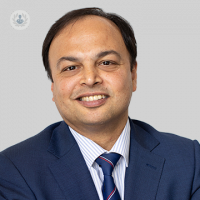What causes chronic pelvic pain syndrome in women?
Written in association with:Chronic pelvic pain syndrome is debilitating pain that some women suffer from. It can be during the menstrual cycle, but not exclusively, and generally, it will last for more than six months.
Mr Parijat Bhattacharjee, an expert gynaecologist, explains what causes chronic pelvic pain syndrome and how it's managed.

What are the common causes of chronic pelvic pain syndrome in women?
Gynaecological causes
The cause of chronic pelvic syndrome is commonly gynaecological, and the primary gynaecological cause is endometriosis. This is where little bits of the womb lining are found elsewhere in the pelvis, and these bleed during every single menstrual cycle and subsequently can cause scarring and pain. Chronic pelvic pain syndrome may also result from previous surgery or previous infection.
Other causes
Apart from gynaecological causes, there can be other causes related to the bowel, such as irritable bowel syndrome (IBS), or related to the waterworks, like interstitial cystitis . It can also occasionally be due to a neuromuscular disorder, which means there is nerve entrapment somewhere in the wall of the tummy, or even excessive joint movements related to the muscles or the bones.
Why is the pain chronic?
Either way, whatever the original cause of the pain, once there is long-standing pain, quite often what happens is that the nerves get hyper-sensitised. This means that even when the original cause of the pain is gone, the nerves can become so hypersensitive that they can be stimulated to cause excessive pain to a stimulus that usually may not be painful. This is not just related to the nerves locally, but it is also the central perception of the pain in the brain that also is altered, so, at a very low threshold for having quite severe pain. This threshold can then be altered during the menstrual cycles, because of the changes in hormones.
How is chronic pelvic pain syndrome treated?
The treatment and management of chronic pelvic pain syndrome can be quite complex. Obviously, if there is endometriosis or scarring, that can be treated surgically, occasionally with medicines as well. Most often, it needs a multidisciplinary approach, where we may need to involve a bowel surgeon and a urologist who can treat interstitial cystitis and the bladder problems.
It may also require a psychological counsellor, who might be able to help with the central perception of the pain as well. Occasionally, we involve psychosexual medicine specialists and pain management specialists, who can help with the local nerve stimulation of the pain.
Physiotherapists are also involved sometimes because the pelvic floor muscles are very sensitive and they can tense up when one is going through this chronic phase of pain. Physiotherapists can often help with various exercises to relax those muscles and decrease the pain as well.
If you experience frequent pelvic pain, arrange an appointment with Mr Bhattacharjee to determine its cause and to find out about your treatment options, via his Top Doctors profile.


